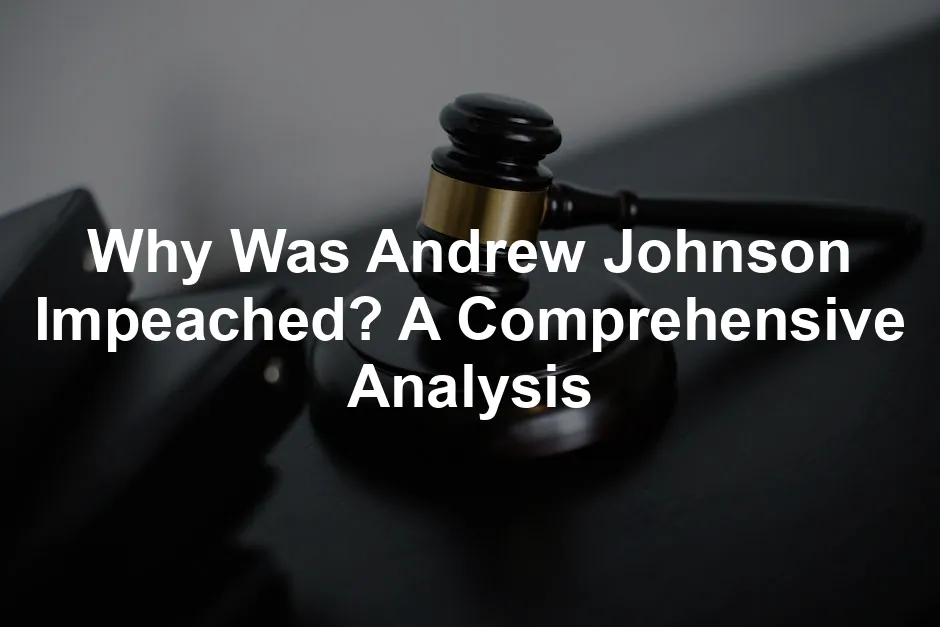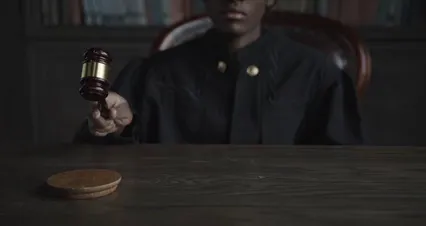
Why Was Andrew Johnson Impeached? A Comprehensive Analysis
Introduction
Andrew Johnson’s impeachment is a pivotal moment in U.S. history. It highlights the clash between presidential power and congressional authority. His presidency unfolded amid intense political strife following the Civil War. This article aims to examine the reasons behind Johnson’s impeachment and its lasting effects on American governance.
Summary and Overview
Andrew Johnson became the 17th president after Lincoln’s assassination in 1865. Initially, he was seen as a unifying figure. However, tensions erupted with Congress, particularly the Radical Republicans. They aimed to reshape the South and secure rights for freed slaves. Johnson’s lenient policies infuriated them, leading to increased conflict.
The crisis peaked with Johnson’s violation of the Tenure of Office Act, which restricted his ability to remove cabinet members without Senate approval. He dismissed Secretary of War Edwin Stanton, a key ally of the Radical Republicans. This act prompted the House of Representatives to impeach him on February 24, 1868. The Senate trial began on March 5 and concluded with his acquittal on May 16, 1868, falling just one vote short of the necessary two-thirds majority for conviction. This event set a precedent for future presidential impeachments.
The impeachment of Andrew Johnson is a significant event in U.S. history, showcasing the tensions between presidential authority and legislative oversight. why was andrew johnson impeached
For those interested in delving deeper into this historical period, I highly recommend “Andrew Johnson: The American Presidents Series” by Annette Gordon-Reed. It provides a comprehensive look at Johnson’s life and presidency.
The Political Context of Johnson’s Presidency
The Civil War and Reconstruction Era
After the Civil War, the United States faced immense challenges. The nation needed to heal and rebuild. Reconstruction aimed to integrate Southern states back into the Union and protect the rights of newly freed slaves. President Abraham Lincoln envisioned a lenient approach, hoping to mend the nation quickly. He aimed for a smooth transition by granting amnesty to most Confederate soldiers and allowing states to rejoin once they pledged loyalty.
However, Lincoln’s assassination in 1865 changed everything. Andrew Johnson, who succeeded him, had different ideas. A Southern Democrat, Johnson favored quick restoration of the South without significant protections for African Americans. He clashed with the Radical Republicans in Congress, who sought stricter measures and more support for civil rights. They pushed for the Civil Rights Act of 1866 and the Freedmen’s Bureau to help former slaves.
Johnson’s policies often undermined these efforts. He vetoed critical legislation aimed at ensuring civil rights for freedmen. This further alienated him from Congress and intensified the conflict. The Radical Republicans felt Johnson’s approach was too forgiving. They believed it would allow former Confederates to regain power and continue oppressive practices. Thus, the stage was set for the political turmoil that would lead to Johnson’s impeachment.
To understand the full scope of Reconstruction, consider reading “The Radicalism of the American Revolution” by Gordon S. Wood. This book offers a deep dive into the revolutionary ideas that shaped the nation.
Johnson’s Background and Political Ideology
Andrew Johnson was born into poverty in North Carolina in 1808. He learned to read and write through the encouragement of his wife, Eliza. His early life shaped his political beliefs, emphasizing the importance of self-reliance and hard work. Johnson’s political career began in Tennessee, where he became a state legislator and later a U.S. Representative.
As a Southern Democrat, Johnson maintained loyalty to the Union during the Civil War. This loyalty earned him the position of military governor of Tennessee. When Lincoln chose him as vice president in 1864, it aimed to unify the nation. However, Johnson’s Southern roots influenced his presidency. He exhibited a clear bias towards white Southerners and held negative views of African Americans.
Johnson believed that the federal government should not impose strict measures on Southern states. His political ideology leaned towards states’ rights, which often conflicted with the Radical Republicans’ vision for Reconstruction. This fundamental disagreement over race and governance set the stage for his eventual impeachment. Johnson’s presidency became a battleground for differing philosophies on how to rebuild a fractured nation.

The Path to Impeachment
Key Legislative Conflicts
Andrew Johnson’s presidency was fraught with tension, especially regarding freedmen’s rights. He often clashed with Congress, particularly the Radical Republicans. They aimed to ensure full rights for freed slaves during the Reconstruction era. Johnson, however, took a more lenient stance.
His vetoes of key legislation fueled this conflict. For instance, he rejected the Freedmen’s Bureau Act, which aimed to provide assistance to freedmen. This law was crucial for helping newly freed African Americans adjust to life post-Civil War. Johnson also vetoed the Civil Rights Act of 1866, which sought to protect the civil rights of all citizens, regardless of race.
The Radical Republicans viewed these actions as direct attacks on their efforts to secure rights for African Americans. They believed Johnson was undermining their attempts to reshape Southern society. This led to significant legislative gridlock. Congress would often override Johnson’s vetoes, showcasing their determination to enforce Reconstruction policies.
For a more detailed account of the legislative battles during this time, I suggest “The Civil Rights Act of 1866: A Brief History with Documents” by David E. Kyvig. It explores the context and implications of this pivotal legislation.
The Tenure of Office Act
The Tenure of Office Act was a pivotal piece of legislation during Johnson’s presidency. Passed in 1867, it aimed to limit presidential power. Specifically, it prevented the president from removing certain officials without Senate approval. This act was designed to protect key cabinet members, particularly those aligned with the Radical Republicans.
Johnson viewed the Tenure of Office Act as unconstitutional. He believed it infringed on his presidential authority. In a bold move, he dismissed Secretary of War Edwin Stanton. Stanton was a staunch ally of the Radical Republicans and had been appointed by Lincoln. Johnson’s decision ignited a constitutional crisis.
The implications of Stanton’s removal were significant. It raised questions about the balance of power between the presidency and Congress. Johnson’s actions were seen as a direct challenge to the authority of the legislature. The Radical Republicans seized this opportunity to push for impeachment.
If you’re curious about the historical significance of the Tenure of Office Act, check out “The Tenure of Office Act: A Historical Perspective” by William D. Pederson. It provides a thorough examination of the act and its implications.
On February 24, 1868, the House of Representatives impeached Johnson. They charged him with violating the Tenure of Office Act, among other accusations. The trial began on March 5, 1868, and was presided over by Chief Justice Salmon Chase. The proceedings garnered widespread public attention, highlighting the intense political divide of the era.
Johnson’s defense focused on the constitutionality of the Tenure of Office Act. His attorneys argued that it did not apply to Stanton, as he was appointed by Lincoln. They claimed Johnson’s actions were within his rights.
Despite Johnson’s defense, the Senate ultimately acquitted him. The vote fell just short of the required two-thirds majority for conviction. This outcome underscored the complexities of presidential power and congressional authority during a turbulent period in American history.

The Impeachment Process
The House Vote
On February 24, 1868, the House of Representatives voted to impeach President Andrew Johnson. This historic event marked the first impeachment of a U.S. president. The vote was largely along party lines, with 126 members supporting impeachment and 47 opposing it. The articles of impeachment focused primarily on Johnson’s violation of the Tenure of Office Act. This act, passed in 1867, aimed to limit presidential power by requiring Senate approval for the removal of certain officials.
The political dynamics were intense. The Radical Republicans, who controlled Congress, were frustrated with Johnson’s lenient policies towards the South. Johnson’s frequent vetoes of legislation aimed at protecting freedmen’s rights fueled the conflict. As tensions escalated, the Radical Republicans saw impeachment as a way to assert their authority and challenge Johnson’s presidency.
Ultimately, the House approved eleven articles of impeachment. These articles accused Johnson of attempting to undermine congressional authority and violating the law. The political motivations behind the impeachment were clear: it was a battle for control over Reconstruction policies and the future of the nation.

The Senate Trial
The Senate trial began on March 5, 1868, presided over by Chief Justice Salmon Chase. The proceedings were highly publicized and attracted significant attention. The trial lasted for nearly three months, concluding on May 26, 1868. The stakes were high, as a conviction would remove Johnson from office.
Key figures emerged during the trial. The prosecution included prominent Radical Republicans like Thaddeus Stevens and Benjamin Butler, who argued that Johnson had abused his presidential powers. They claimed his actions, particularly the dismissal of Secretary of War Edwin Stanton, were a direct challenge to Congress.
The defense team included notable attorneys, such as Henry Stanbery and William Evarts. They argued that Johnson’s actions were constitutional and within his rights as president. They contended that the Tenure of Office Act was itself unconstitutional.
Significant moments during the trial included passionate speeches and testimonies that highlighted the deep political divisions of the time. The prosecution presented evidence that Johnson’s actions undermined the authority of Congress. In contrast, the defense emphasized the need for a strong presidential role during Reconstruction.
On May 16, 1868, the Senate voted on the articles of impeachment. The result was a narrow acquittal, with 35 senators voting guilty and 19 not guilty. Johnson escaped removal by just one vote, demonstrating the polarized political landscape. The trial set a precedent for future impeachment proceedings, underscoring the complexities of checks and balances in American governance.

The Outcome and Its Consequences
Acquittal and Political Ramifications
Andrew Johnson’s impeachment trial concluded with a dramatic Senate vote. On May 16, 1868, the Senate acquitted him by a mere one vote. The final tally stood at 35 guilty and 19 not guilty. This narrow margin reflected deep divisions within the Senate. Many senators believed the impeachment was politically motivated rather than based on actual crimes.
Critics of Johnson were frustrated. They viewed his actions as undermining the authority of Congress and hindering Reconstruction efforts. Yet, some senators, including key Republicans, feared that convicting Johnson could set a dangerous precedent. They worried it might erode presidential power and disrupt the balance of governance.
In the immediate aftermath, Johnson remained in office but faced significant political fallout. His presidency was weakened, and he continued to clash with Congress over Reconstruction policies. The Radical Republicans pushed forward with their agenda, leading to significant changes in the South. Johnson’s acquittal did not halt the movement for civil rights; instead, it fueled a renewed commitment among Radical Republicans to protect the rights of freedmen.
If you’re interested in the broader implications of Reconstruction, check out “Reconstruction: America’s Unfinished Revolution, 1863-1877” by Eric Foner. This book provides a detailed analysis of the Reconstruction period and its challenges.
The long-term consequences of this trial were profound. It highlighted the tensions between the executive branch and Congress, shaping future impeachment proceedings. The battle over Reconstruction continued, influencing American politics for decades. Johnson’s presidency, marred by his impeachment, left a complicated legacy within the context of American governance. Ultimately, this event marked a pivotal moment in the ongoing struggle for civil rights and the power dynamics within the U.S. government.

Legacy of Johnson’s Impeachment
The impeachment of Andrew Johnson set a crucial precedent for future presidential impeachments. It marked the first time a sitting president faced such proceedings, establishing a framework for how Congress could hold the executive accountable. This event showcased the complexities of the impeachment process, influencing how subsequent cases would unfold.
Historically, Johnson’s impeachment underscored the contentious nature of American governance during a transformative era. It illustrated the challenges of balancing presidential power with congressional authority. The trial revealed the potential for impeachment to be used as a political weapon, raising questions about its implications for future presidents.
For those who wish to explore further, I recommend “The Impeachment of Andrew Johnson” by Michael J. Gerhardt. This book provides insights into the impeachment process and its political ramifications.
The legacy of Johnson’s impeachment continues to resonate today. It serves as a reminder of the importance of checks and balances in government. Future Congresses would look back on this trial when addressing issues of presidential conduct. The principles established during this pivotal moment have been invoked in later impeachments, shaping the political landscape.
Ultimately, Johnson’s impeachment highlighted the ongoing struggle for civil rights and the role of government in protecting those rights. It marked a significant chapter in American history, illustrating the complex interplay between leadership and accountability in the pursuit of justice.
Please let us know what you think about our content by leaving a comment down below!
Thank you for reading till here 🙂
All images from Pexels




